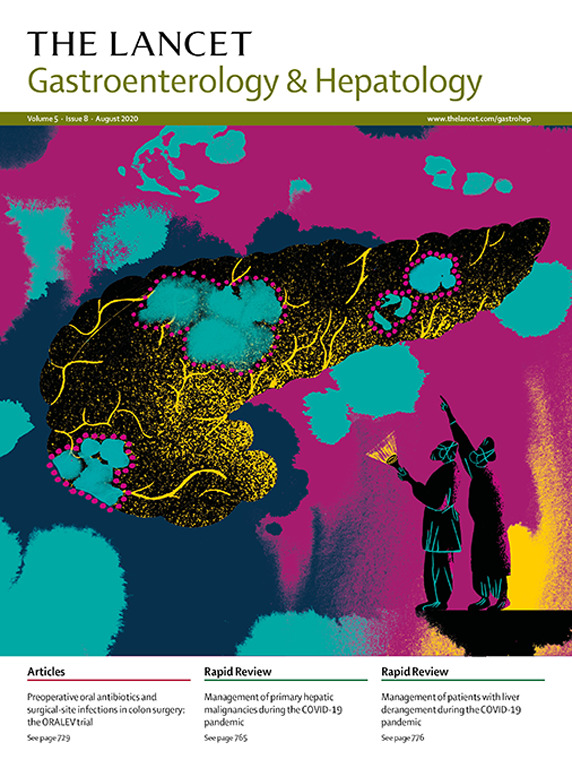Early antiviral treatment with tenofovir alafenamide to prevent serious clinical adverse events in adults with chronic hepatitis B and moderate or high viraemia (ATTENTION): interim results from a randomised controlled trial
IF 30.9
1区 医学
Q1 GASTROENTEROLOGY & HEPATOLOGY
引用次数: 0
Abstract
Background
Current guidelines for chronic hepatitis B recommend antiviral therapy for individuals with non-cirrhotic chronic hepatitis B only if they have significant liver fibrosis or elevated alanine aminotransferase (ALT) concentrations. We aimed to assess the efficacy of early antiviral treatment in preventing serious liver-related adverse events in individuals with non-cirrhotic chronic hepatitis B and moderate or high viraemia but normal or mildly elevated ALT concentrations.Methods
ATTENTION is an ongoing randomised controlled trial being conducted at 22 centres in South Korea and Taiwan. Adults aged 40–80 years with non-cirrhotic chronic hepatitis B and serum hepatitis B virus (HBV) DNA concentrations between 4 log10 IU/mL and 8 log10 IU/mL, and ALT concentrations lower than 70 U/L for males and 50 U/L for females were recruited and randomly assigned (1:1) to receive either oral tenofovir alafenamide (25 mg daily) or no antiviral treatment (observation). The primary endpoint was a composite of hepatocellular carcinoma, hepatic decompensation (eg, development of portal hypertensive complications including ascites, gastro-oesophageal varices, or Child-Pugh score of ≥7), liver transplantation, or death from any cause, analysed in the intention-to-treat population. The safety population comprised all randomly assigned participants who received at least one dose of the study treatment. This interim analysis was prespecified at 4 years after enrolment of the first participant. This study is registered with ClinicalTrials.gov, NCT03753074.Findings
Between Feb 8, 2019 and Oct 17, 2023 (the cutoff date for the first interim analysis), 798 individuals were screened and 734 were randomly assigned (369 to tenofovir alafenamide and 365 to observation). At a median follow-up of 17·7 months (IQR 8·3–24·4), the primary endpoint occurred in 11 participants: two in the tenofovir alafenamide group (both hepatocellular carcinoma) and nine in the observation group (seven hepatocellular carcinoma, one hepatic decompensation, and one death), corresponding to an incidence rate of 0·33 per 100 person-years in the tenofovir alafenamide group and 1·57 per 100 person-years in the observation group (hazard ratio 0·21 [97·5% CI 0·04–1·20]; p=0·027). The difference between the two groups did not surpass the prespecified boundaries required to stop the trial early. Serious adverse events, excluding primary endpoints, were reported in 23 (6%) participants in the tenofovir alafenamide group and 24 (7%) in the observation group.Interpretation
The results of this interim analysis suggest that early treatment with tenofovir alafenamide reduces the risk of liver-related serious adverse events compared with observation in adults with non-cirrhotic chronic hepatitis B and moderate or high viraemia but normal or mildly elevated ALT concentrations. Although these findings await confirmation in planned future analyses, they suggest that existing guidelines could be expanded to allow early antiviral therapy in patients with a moderate or high HBV viral load, irrespective of ALT concentrations.Funding
Government of South Korea and Gilead Sciences.求助全文
约1分钟内获得全文
求助全文
来源期刊

Lancet Gastroenterology & Hepatology
Medicine-Hepatology
CiteScore
50.30
自引率
1.10%
发文量
0
期刊介绍:
The Lancet Gastroenterology & Hepatology is an authoritative forum for key opinion leaders across medicine, government, and health systems to influence clinical practice, explore global policy, and inform constructive, positive change worldwide.
The Lancet Gastroenterology & Hepatology publishes papers that reflect the rich variety of ongoing clinical research in these fields, especially in the areas of inflammatory bowel diseases, NAFLD and NASH, functional gastrointestinal disorders, digestive cancers, and viral hepatitis.
 求助内容:
求助内容: 应助结果提醒方式:
应助结果提醒方式:


